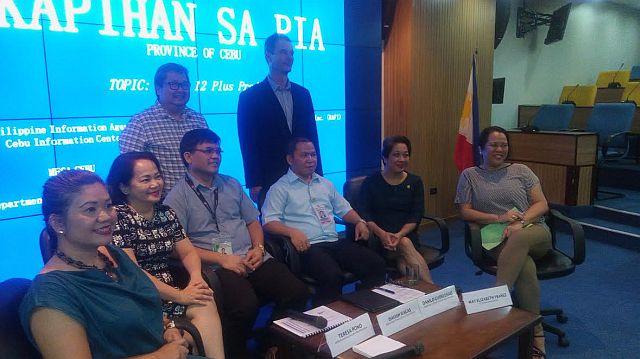
Lito Maderazo, Cebu Chamber of Commerce and Industry (CCCI) past president, (standing, left) with AFOS Foundation, CCCI and Department of Education officials during the weekly Kapihan sa PIA forum in Cebu City. (CDN PHOTO/VICTOR ANTHONY V. SILVA)
To bridge the gap between skills in the workforce and the labor needs of businesses today, the Cebu Chamber of Commerce and Industry (CCCI) is calling for more or greater private sector participation in shaping the government’s K to 12 program.
Lito Maderazo, CCCI past president, said the organization is set to begin phase two of the K to 12 Plus project, which it piloted in Cebu two years ago in partnership with Germany-based AFOS Foundation.
“We will come up with an Accreditation Certification Assessment System (ACAS), through which the industry and tech-voc schools, and, hopefully the government, if we can convince them, will come up with qualification profiles for certain jobs,” he said during a news forum on Wednesday.
Maderazo said the system will determine what kind of qualities a certain member of the workforce should have and how they should be trained.
He also proposed that instead of having teachers test their aptitude at the end of an academic year, industry experts would examine them.
The skills mismatch in the labor force has always been a problem, said Maderazo, not just in Cebu, but in the whole country.
He said if government would be able to address this issue, with the support of the private sector and academe, businesses would become more competitive.
“Micro, small, and medium-scale enterprises are grappling with the fact that we are losing market share, even in the domestic market, because we are not competitive enough. But if we have better talent and a more skilled workforce, we will be able to change that,” said Maderazo.
Maderazo said he sees a lot of opportunities for business growth and job creation if there is an improvement in the level of skills in the workforce and if these match the requirements of the industry.
K to 12 Plus project
CCCI and AFOS’ K to 12 Plus project was implemented in Cebu City in 2015, one year before the implementation of the government program nationwide.
The project aimed to lay the groundwork for a demand- and practice-oriented Technical-Vocation Education Track (TVET), with industry playing the lead role.
This was done through piloting dualized training approaches in the Senior High School (SHS) tech-vock track, covering tourism, food manufacturing, and construction-related skills, which were identified by the business community as “sunshine” industries.
Dualized training
Dualized training, in its basic form, involves students learning both in a school and a company.
In most countries where this form of education is practiced, such as Germany, Austria, Brunei, and China, among others, students spend 80 percent of their time studying in a workplace while the remaining 20 percent is spent on campus.
The CCCI has tapped its members to provide immersion training for the students enrolled under the project.
Under the current set-up, SHS students are only required to immerse in their chosen specializations for 80 hours in one semester, but industry players are pushing for it to be adjusted to 320 hours.
Close to 100 SHS students from Barrio Luz National High School, Zapatera National High School, and Banilad Center for Professional Development, which were the pilot areas in Cebu, will be among the first ones to graduate under the K to 12 program on April 7.
AFOS will no longer extend the project, but the foundation will continue helping the CCCI as it seeks to make the initiative more sustainable.